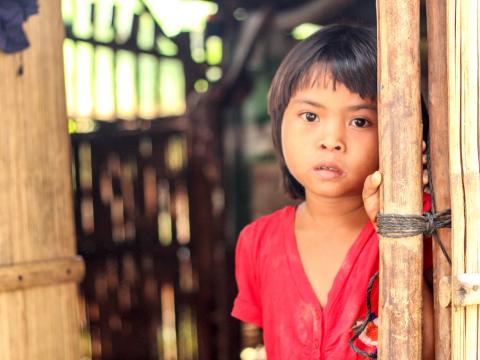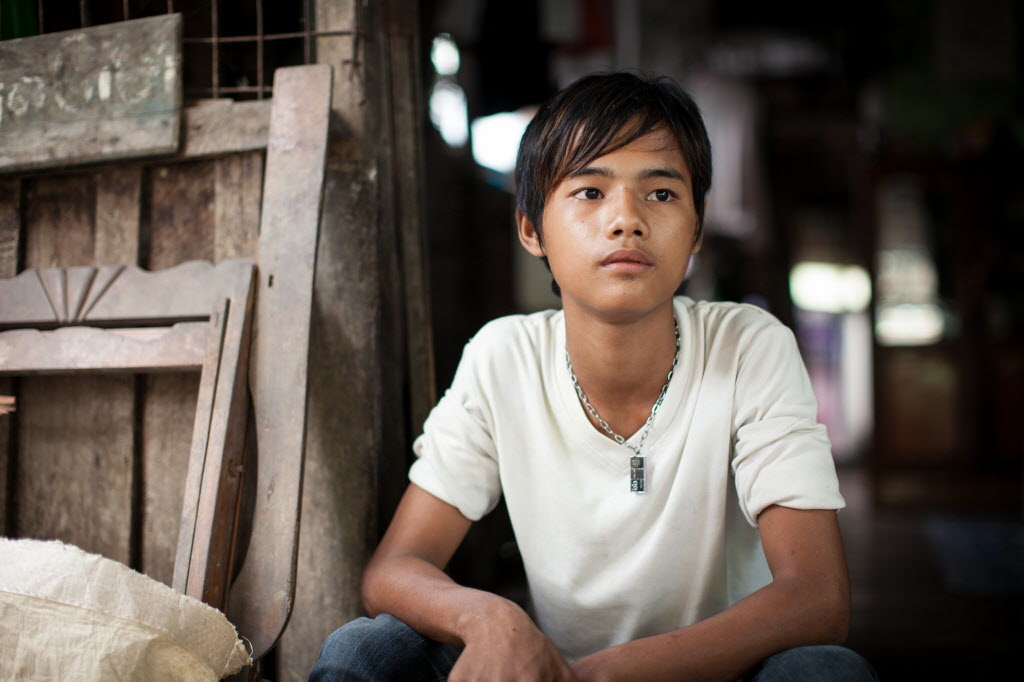A world in two halves, with and without birth certificates

Last year, my nine-year-old son Shaleem painted a picture about the rights of the child for a school project.
In Asia, an estimated 135 million children are unaccounted for; three out of 10 children under five do not have a birth certificate.
I was surprised. He divided the frame into two halves. The first half depicted a child with a happy face, wearing good clothes, playing and having fun in a park. On the other half of the frame showed a child with an unhappy face, wearing torn clothes and working under the hot sun. When I asked him why he painted this, he explained that every day on his way to school here in Phnom Penh he sees other children who are working. “Do they not have rights to go to school, to play and to have fun?” he asked me.
After a short pause I told Shaleem he was correct. Those children have the same rights as him. Yet, due to circumstances created by adults - their family, community, or, even, their government – those children do not enjoy the rights entitled to them.
Twenty-five years ago, governments signed the International Convention on the Rights of the Child (CRC). It was the most widely ratified international human rights treaty in history. But if we ask ourselves if all children are able to enjoy those rights, the answer is no. Today, millions of children around the world still do not have access to even the most basic rights – including the right to an identity.
Let me try to paint a picture of the children who are living without an identity – those who were never given birth registration documents or other legally recognized identity documents.
Living without a birth certificate
Fourteen-year-old Zaw is among the estimated 135 million children in Asia unaccounted for. He lives in Myanmar. There, according to a 2014 report by UNICEF, three out of 10 children under five do not have a birth certificate.
Already, his life has been very difficult.
As a toddler, Zaw’s parents divorced and when they both remarried, they left Zaw in the care of his grandparents. Zaw enrolled in school but dropped out when he reached grade 5 at the age of 12 because his family didn’t have enough money.
Although Zaw lives with his grandparents and he is from a majority ethnic group, he never received a birth certificate or was registered as part of the family – either under his mother or father’s family registration or grandparent’s family registration.
What will happen to Zaw if he does not have official identity documents?
Without those documents, Zaw will never be a fully recognized citizen of Myanmar and will become stateless. He will never be able to get a legal job – as official documents are required for employment in Myanmar. He will never get a passport to legally travel to foreign countries, and he will face difficulty moving around his own country. If he travels without proper documentation for work, he could easily become a victim of trafficking. He will never be able to vote and will never be able to officially speak on political matters that may affect him.
A critical first step
In other countries in Asia, birth registration and identity documents are required for children to go to school, to visit the doctor or to get help from the police.
Birth registration is a critical first step to ensure the rights of a child are realized as the documents grant a legal identity and citizenship. On the other hand, they also provide vital statistics for governments that are essential for planning purposes.
According to UNICEF, children who do not have birth registration documents often live on the margins of society and are vulnerable to circumstances that could steal away their hopes and dreams. The time is now to change the future for these children.
Now let’s paint the other half of the picture – the hopeful side.
A decade of promise
This week in Bangkok, government leaders from more than 40 nations in Asia are meeting to sign a declaration to end statelessness and ensure all citizens have the necessary documents to access essential services necessary for them to thrive.
The Ministerial Conference on Civil Registration and Vital Statistics in Asia and the Pacific, held from 24 to 28 November, will see Asian governments declare the years 2015 to 2024 be the Civil Registration and Vital Statistics Decade. And what makes this particular conference special is that Asian governments will also be developing a Regional Action Framework to achieve universal civil registration of births, deaths and other vital life events.
If properly implemented, this framework will provide all individuals with legal documentation and ensure citizen rights are obtained in a timely manner.
World Vision is urging governments to develop free and accessible birth registration systems in every Asian country that reach all citizens, including the most vulnerable.
World Vision is urging governments to develop free and accessible birth registration systems in every Asian country that reach all citizens, including the most vulnerable. We encourage governments to establish a ministerial level coordination body that also includes civil society to monitor the implementation of the Regional Action Framework on Civil Registration and Vital Statistics. Finally, we call on governments to allocate sufficient resources and set targets for Civil Registration and Vital Statistics systems that cover all vital life events.
In the case of Zaw, the boy from Myanmar, World Vision is working with local authorities and concerned government departments to obtain the proper identity documents for him. Given the organization’s strong reputation in the country, it is now likely that Zaw will receive the necessary documents, though a long wait time and endless paperwork are still inevitable.
I am hopeful by the time my son Shaleem turns 18, there will be no more stateless children in Asia. I believe this is achievable if governments and stakeholders play their role diligently and fulfill their commitments.
